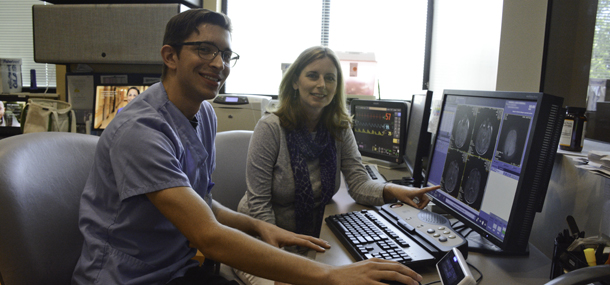
Perhaps your child’s MRI examination is ordered with “MRS.” What does that mean?
In radiology, MRS stands for magnetic resonance spectroscopy. This test allows us to see certain naturally appearing chemicals in the body in addition to the usual pictures taken with the MRI exam.
The MRS is not an entirely new exam, rather just a few measurements attached to the end of the study. The MRS is often referred to as “a biopsy without needles.” Much like a typical biopsy, multiple MRS sequences may be taken in different locations of the body. MRS is usually obtained in small regions, such as the white matter in the brain or the muscles in the thigh. Each MRS test usually takes between 3 and 5 minutes, depending on which chemical we want to focus on and where we are looking in the body. No additional equipment is used for this test; it requires only the MRI system.

At Cincinnati Children’s, we have a dedicated chemist who works with our technologists and radiologists to obtain and interpret the MRS. The results help us diagnose metabolic diseases, infections, brain tumors, and other injuries.
Why do MRS? When something wrong happens in the body, it often produces too much or too little of a chemical. For example, when a tumor grows, it often has too much choline. We review the MRS, measure chemical levels, and compare them to normal standards for age and location within the body. MRS put together with MRI helps us focus in on a specific diagnosis.
We routinely use MRS in the brain and thighs, and soon we’ll be using it to look at the liver. Sometimes our clinical discoveries with MRS lead to the discovery of new disorders, such as creatine transporter deficiency syndrome, a leading cause of inherited intellectual disability. With just a few extra minutes of scanning, we can receive a world of information about your child.
Written by Kim Cecil, PhD and edited by Tony Dandino, RT.